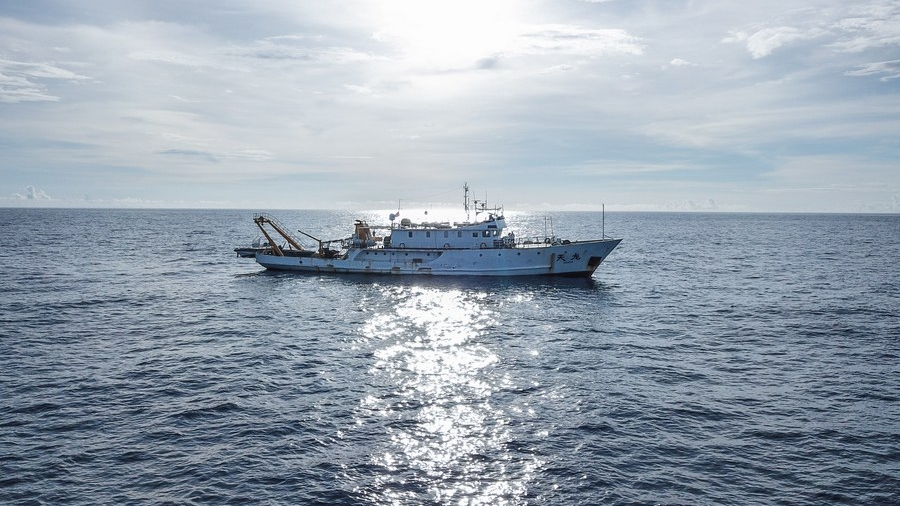By Hannan Hussain

Editor's note: Hannan Hussain is a foreign affairs commentator and author. He is a Fulbright recipient at the University of Maryland, the U.S., and former assistant researcher at Islamabad Policy Research Institute. The article reflects the author's opinions and not necessarily the views of CGTN.
In a manner of speculation that has come to dominate U.S. threat assumptions in stable waters, Washington's top diplomat delivered an erroneous reading of the maritime peace trajectory in the South China Sea. "We have seen dangerous encounters between vessels at sea and provocative actions to advance unlawful maritime claims. The United States has made clear its concerns regarding actions that intimidate and bully other states from lawfully accessing their maritime resources," remarked U.S. Secretary of State Antony Blinken during the United Nations Security Council (UNSC) meeting on maritime security on August 9.
Worth remembering is the underlying expectation from the meeting itself: to better coordinate global support and strengthen maritime security cooperation, in light of initial headway welcomed by the United Nations.
And so, by raising false alarms in the South China Sea, putting a spin on the 1982 United Nations Convention on the Law of the Sea (UNCLOS), and leveraging the Council to tout unilateral U.S. "concerns" that feed political objectives, the U.S. makes it known that the actual threat to maritime stability stems from its own unrestrained interference.
Consider this. What Blinken billed as a theater of maritime provocations against unlawful maritime claims is actually a region that most territorial stakeholders – in glaring contrast – stand determined to safeguard through their "collective commitment" to peace. This broad-based commitment assumes a concrete character that's increasingly impossible to ignore. For instance, it shows in the advancement of a South China Sea procedure of engagement, and in the recognition of that code in major regional fora. Similarly, countries' nuanced resistance to any military posturing in the Sea, their reluctance to import an interventionist tone in key declarations, and their uniformed treatment of UNCLOS as the alpha and omega of long-term stability in the Sea, collectively take the weight away from Blinken's wishful hypothesis: that nations in the sea "protested" intimidation, provocation and bullying from other states in a spirit that aligns closely with that of the U.S.
Rather, this entire detour represents Washington's toxic interpretation of a South China Sea big on conflict – an imagined scenario that no amount of U.S. public diplomacy campaigning in Asia could render legitimate. Moreover, on isolated appeal, the same was true in Monday's meeting: U.S. was the only member state to bring up the South China Sea under the guise of both a rules-based maritime order, and the presumption of a "serious threat."

On legitimacy, Blinken is also completely wrong to insist that the Arbitral Tribunal in the South China Sea serves as a key measure of all that passes as lawful, unlawful or legally binding in the region. "Five years ago, an arbitral tribunal constituted under the 1982 Law of the Sea Convention delivered a unanimous and legally binding decision to the parties before it firmly rejecting unlawful, expansive South China Sea maritime claims as being inconsistent with international law," Blinken told the meeting.
In truth, the tribunal – much like the quality of Washington's Monday invective – was unilateral in its initiation, and thus by definition, void. It held no jurisdiction, demonstrated no credible recognition of vital state consent, and rather infringed upon China's UNCLOS-aligned rights as a state party to opt for dispute settlement procedures of its own accord. In short, the 2016 tribunal award that Blinken hailed as Washington's signature reference at the meeting, stood recognized as null and always remained without an iota of binding force.
To still argue then that a symmetry exists between the controversial tribunal award, principles of the UN Charter, as well as the UNCLOS, is to effectively prove China's point at large: that the U.S. hasn't ratified the very convention it claims to uphold, and that by backing arbitrary interference, it demonstrates zero credibility on maritime issues.
Ultimately, for a UNSC debate genuinely aimed at underscoring the significance of maritime safety and concrete options to address illicit maritime activity, it is a damning contrast to find Washington's global concerns inextricably wedded to geopolitical interference once again.
At the very least, some degree of preparation can be expected from a responsible major power on what represents a legally binding reference point, what qualifies as a credible maritime concern to all, and what will manifest a genuine expression of noninterference.
In Washington's case, its unwarranted South China Sea publicity stunt proved to be an unmitigated failure on all three fronts.













